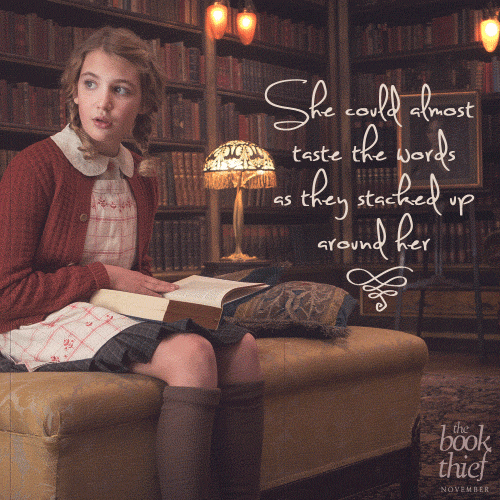When I read The Book Thief by Markus Zusak, I thought what an amazing movie this story would make. And sure enough when the movie came on the cinemas, it did not disappoint.
It was every bit of the book coming to life - a sweet, refreshing tale about a young girl's resilience to war and inhumanity. The director punctuated the movie with warm colours against a drab 1930s neighbourhood in Germany, which befits the story about childhood innocence against the harshness of war and racism. It was a relief to many fans of the book that the screenwriter maintained the soothing narration by Death and conveyed the story with minimal omissions. Albeit a small modification to the plot, the director kept loyal to the book, for any deviation would have ruined the beauty of the story.
11 year-old Liesel Meminger is entrusted to the care of her new foster parents after surviving a long train ride with her mother and a brother who died along the way. Stricken with grief in an unfamiliar environment, Liesel finds solace in a book that she stole and slowly learns to read with the help of her kind foster father Hans Hubermann. She becomes friends with Rudy, the boy next door who dreams to be Jesse Owens and slowly blends into the rhythm of life in Hummel Street. The story did not feature many historical events of the Holocaust, but kept a crucial scene of the infamous book burning held to destroy 'un-German thinking'. Liesel reluctantly throws a book into the heap amidst the feverish chants of Nazism, only to steal a book afterwards. This is one of the few scenes the director used to illustrate the power of childish innocence against adult folly, a purity that renders them immunity to propaganda and brainwash.
The lives of the residents begin to crack with the onset of war and the Holocaust that is gaining momentum. One day, the Hubermanns receive an unexpected visit from Max, a Jew seeking refuge with the German family after a promise Hans made to his father. From then on, the Hubermanns live with a dreadful secret of hiding a Jew, a consequence that would be dire if discovered. Young Liesel carries the burden of the secret with her, fully aware of the consequence should she accidentally divulge the secret. As time goes by, there unfurls a relationship between Max and Liesel as the former shares his love for reading with the girl. While hiding in a small corner of the basement for prolonged periods, subjected to cold and disease, Liesel becomes his only connection to the outside world and sanity. One especially poignant scene takes place when Max wanders out and sees stars during a bomb raid, after hiding in the basement for two long years.
When situations get worse and Jews begin to get tormented nearby, Max decides not to endanger the family and leaves. The plight of the Jews becomes more evident when the extermination of Jews grow more intense towards the end of WWII. I will not disclose the ending of the story, but it is the only part where I find more affecting when reading the book than watching the movie. Then again the movie was not meant to overwhelm viewers with devastation, and so it was a calm, tender and soothing end, a rather heart-warming conclusion to the story.
Although set against the war, the film handles the subject with a gentleness that belies the atrocity. The Book Thief spared us the harrowing details of suffering compared to the stark portrayals in The Pianist (as shared in my previous post). The depiction of war is sanitised, making it a brilliant introduction to the subject of war for children. It is a tale of humanity through the eyes of a young girl, of children trying to grapple with loss and grief and forced to face the brutality of war, yet somehow sheltered by childishness, inspiration, dreams and curiosity that protected them to an extent. Liesel Meminger is played by a new doe-eyed actress Sophie Nelisse, whose angelic looks and natural acting gives credence to the role. Emily Watson is aptly detestable as the stern foster mother who later warms audience's hearts as she reveals to be a kind and resilient woman in tough times. Geoffrey Rush gives the star power with a reasonable performance as the foster father, although I can't help feel that he's more Ian Mckellen-ish than a truly lovable father figure.
The Book Thief is an empowering movie for young people and an inspiration to girls, rightly deserving to be in the canons of young heroine literature like the characters in Miyazaki's films - Chihiro in Spirited Away, Sophie in Howl's Moving Castle, and my all-time favourite, Anne Shirley in Anne of Green Gables. It is certainly a breathe of fresh air to the trashy teen romances flooding the market and girls spanking their asses in music videos.
The Book Thief is an empowering movie for young people and an inspiration to girls, rightly deserving to be in the canons of young heroine literature like the characters in Miyazaki's films - Chihiro in Spirited Away, Sophie in Howl's Moving Castle, and my all-time favourite, Anne Shirley in Anne of Green Gables. It is certainly a breathe of fresh air to the trashy teen romances flooding the market and girls spanking their asses in music videos.










0 Yorumlar